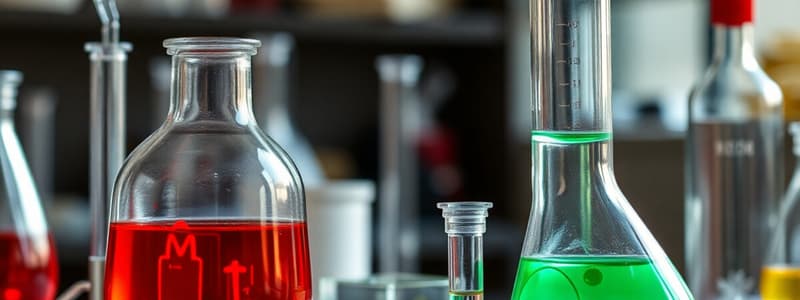Podcast
Questions and Answers
In the scientific method, what is the role of a hypothesis?
In the scientific method, what is the role of a hypothesis?
- To definitively prove a scientific theory.
- To provide a systematic way to gather information.
- To record and analyze experimental data.
- To offer a testable explanation or prediction about an observation. (correct)
Which of the following is a critical component of a well-designed experiment?
Which of the following is a critical component of a well-designed experiment?
- Manipulating multiple variables simultaneously to increase efficiency.
- Avoiding detailed observation to prevent bias.
- Having a control group for comparison. (correct)
- Ensuring absolute certainty in the results.
What is the primary purpose of the 'Analyze' step in the scientific method?
What is the primary purpose of the 'Analyze' step in the scientific method?
- To formulate a testable question.
- To share your results with the scientific community.
- To organize and interpret the data to determine if it supports the hypothesis. (correct)
- To design the experimental procedure.
How do qualitative observations differ from quantitative observations?
How do qualitative observations differ from quantitative observations?
What is the role of repeating experiments in the scientific method?
What is the role of repeating experiments in the scientific method?
How does a 'null hypothesis' differ from an 'alternative hypothesis'?
How does a 'null hypothesis' differ from an 'alternative hypothesis'?
Which of the following questions is most suitable for initiating a scientific investigation?
Which of the following questions is most suitable for initiating a scientific investigation?
What is the purpose of 'research' in the scientific method?
What is the purpose of 'research' in the scientific method?
Which of the following should be considered when defining a scientific problem?
Which of the following should be considered when defining a scientific problem?
What does a 'good' hypothesis allow you to do?
What does a 'good' hypothesis allow you to do?
How should an experiment be designed?
How should an experiment be designed?
What should you visualize the analysis results in?
What should you visualize the analysis results in?
What should you consider when results do not match the hypothesis?
What should you consider when results do not match the hypothesis?
What question does qualitative data describes?
What question does qualitative data describes?
What is the key difference between a scientific observation and a scientific inference?
What is the key difference between a scientific observation and a scientific inference?
Why is it important for scientists to communicate their results after conducting an experiment?
Why is it important for scientists to communicate their results after conducting an experiment?
Which variable does the experimenter manipulate?
Which variable does the experimenter manipulate?
What does the experimental group receive?
What does the experimental group receive?
What is a key characteristic of a good hypothesis?
What is a key characteristic of a good hypothesis?
According to the materials, who is considered the father of the scientific method?
According to the materials, who is considered the father of the scientific method?
Flashcards
Scientific Method
Scientific Method
A sequence of steps used by scientists to test hypotheses and differentiate truth from myths and superstitions.
Observe
Observe
Identify a problem and pose a question about an observation e.g. How, What, When, Who, Which, Why, or Where?
Research
Research
Investigate and collect data related to the problem. Consult existing records or experts.
Hypothesize
Hypothesize
Signup and view all the flashcards
Null Hypothesis
Null Hypothesis
Signup and view all the flashcards
Alternative Hypothesis
Alternative Hypothesis
Signup and view all the flashcards
Test
Test
Signup and view all the flashcards
Analyze
Analyze
Signup and view all the flashcards
Conclude
Conclude
Signup and view all the flashcards
Communicate Results
Communicate Results
Signup and view all the flashcards
Independent Variable
Independent Variable
Signup and view all the flashcards
Dependent Variable
Dependent Variable
Signup and view all the flashcards
Controlled Variable
Controlled Variable
Signup and view all the flashcards
Control Group
Control Group
Signup and view all the flashcards
Experimental Group
Experimental Group
Signup and view all the flashcards
Observation
Observation
Signup and view all the flashcards
Inference
Inference
Signup and view all the flashcards
Quantitative Data
Quantitative Data
Signup and view all the flashcards
Qualitative Data
Qualitative Data
Signup and view all the flashcards
Theory
Theory
Signup and view all the flashcards
Study Notes
- Scientific method is a sequence of steps to test hypotheses and differentiate truth from myths, also used to validate information.
- The scientific method is a process for experimentation used to explore observations and answer questions.
- The scientific method is a systematic way of generating information based on keen observation, persistent experimentation, and intuitive inferences.
- Scientific method takes a systematic and orderly approach to gathering information, data, and solving problems.
- The scientific method involves observations, identifying the problem, gathering related information, formulating hypotheses, designing/performing experiments, and drawing conclusions.
Steps of the Scientific Method
- Observation identifies a problem, and poses a question. It includes: How, What, When, Who, Which, Why, or Where?
- Research involves investigating and collecting information related to a problem.
- Hypothesis is an educated guess about how things work and the factors that affect a problem.
- A hypothesis attempts to answer the question with a testable explanation and must allow you to then make a prediction
- The Null hypothesis (Ho) is written in negative terms.
- Alternative hypotheses (H1) are written in affirmative terms.
- Test involves designing an experiment and gathering the materials needed.
- Treatment should be identified as it is the variable manipulated to compare your baseline.
- Details that occur when one variable is manipulated are observed and recorded in testing.
- Repeating experiments ensures that the first results were not accidental.
- Analysis involves organizing and presenting data in tables or graphs.
- Visualizing results helps to understand what the data and findings imply.
- During analysis, measurements are collected, analyzed, and tested to see if they support your hypothesis.
- Conclusion involves drawing a conclusion based on your findings and interpretations of the data, if data analysis agrees with your hypothesis.
- A recommendation can be made for further study if the data supports the hypothesis.
- The difficulties encountered during the experiment should be shared, and how to address the differently in the future explained.
- An alternative solution to the problem can be recommended if the data refutes the hypothesis.
- When results do not match the hypothesis, avoid changing the hypothesis, try to determine why hypothesis and experimental results do not match.
- Consider future recommendations to future researchers to improve an investigation if results don't match hypothesis
Communicate Result
- Communicate results through a final report and/or a display board to complete the science activity.
- Scientist do this through publishing final reports in scientific journals, presenting on posters, or at scientific meetings.
Qualities of a good hypothesis
- A good hypothesis should be observable, meaning that it should contain an outcome that can be observed and recorded.
- A good hypothesis should also be measurable under conditions that are easily measured.
- A good hypothesis should also be testable by being subjected to experimentation.
- Hypotheses serve as calculated guesses to answer a scientific problem, so there is no such thing as a right or wrong hypothesis.
Data Collection
- A specific plan conducts the experiment/research and determines how to collect the data.
- When planning an experiment/research, consider questions such as:
- How will I test my hypothesis?
- What data do I need to collect?
- How will I collect the data?
- What materials do I need?
- Is there a control needed to compare the data?
- How will I plan my time?
- How many samples and tests do I need?
Data Organization and Summarization
- Observations must be written down in both qualitative and quantitative forms.
- You should ask yourself:
- How will I organize and summarize the data?
- Will l use graphs, tables or charts?
- Can I see patterns or relationship in my data?
Independent, Dependent and Controlled Variables
- Independent variables are changed and manipulated or the cause.
- Dependent variables are the responding variable or the effect.
- Controlled variables are kept constant or treated the same.
- Independent variables are also known as "explanatory variables", "manipulated variables", or "controlled variables.".
- Dependent variables are are also termed as “measured variable," the "responding variable," or the "explained variable".
- The experimenter brings about change in the independent variables.
- Changes in the independent variables cause changes in the dependent variables.
Control and Experimental Groups
- CONTROL GROUP serves as the standard for comparison and has the same conditions as the other groups with no manipulation of the variable.
- EXPERIMENTAL GROUP is also known as a treatment group and receives the treatment to study it's effects.
Application of the Scientific Method
- Although scientists modify the scientific method when direct experimentation is not possible, they still discover cause and effect relationships.
History of the Scientific Method
- Sir Francis Bacon (1561-1626) is considered the father of the scientific method, but he was preceded by thinkers who formulated the ideas that inspired him.
- Aristotle pioneered scientific method in ancient Greece.
Scientific Theory
- A hypothesis turns into a theory when consistent results are obtained from a large number of repeated experiments.
- A theory is based on observations, research, and experimentation using factual evidence or data and explains an observed occurrence or phenomenon.
Observation vs Inference
- Qualitative observations use adjectives to describe what you observe.
- Quantitative observations use numbers to measure what you observe.
- Objective observations are based on facts that can be independently verified
- Subjective observations are based on personal opinions or interpretations.
- Inferences are interpretations or conclusions drawn from observations based on prior knowledge or logical reasoning.
Quantitative vs Qualitative Data
- Quantitative data is countable or measurable, relating to numbers, is factual, and gathered by measuring and counting things.
- Qualitative data is descriptive, using words and language to describe certain attributes, and is dynamic and subjective.
Studying That Suits You
Use AI to generate personalized quizzes and flashcards to suit your learning preferences.




